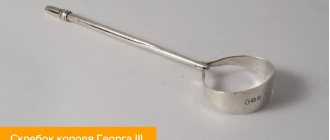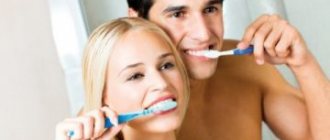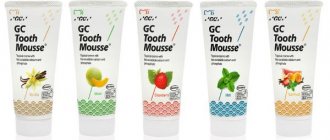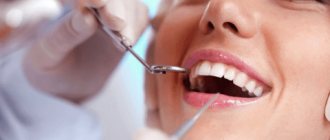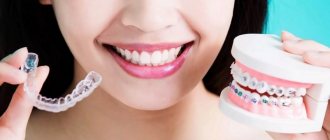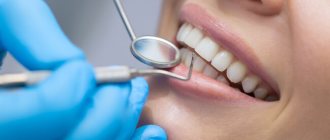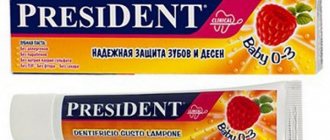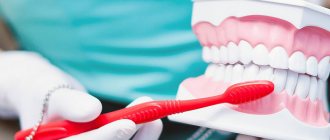Author: ProfGid
A dental hygienist is a specialist who is highly knowledgeable about how to care for your mouth. He not only talks about hygiene, but also removes tartar, helps prevent caries, stomatitis, pulpitis and other dangerous conditions. By the way, in 2022, the ProfGid career guidance center developed an accurate career guidance test. He himself will tell you which professions are suitable for you, and give an opinion about your personality type and intelligence.
- Courses
Short description
It is simply impossible to maintain healthy teeth without constant monitoring of oral hygiene. A variety of infections, untimely removal of plaque, and failure to follow simple recommendations regarding hygiene procedures lead to teeth hurting sooner or later. Regular visits to a dental hygienist are a means of preventing early caries, the development of periodontal diseases, and enamel destruction.
Such specialists have a medical education and most often work together with dental technicians and dentists, taking part in the complex treatment of patients. Their areas of interest include the following states:
- prevention and diagnosis of caries;
- all types of periodontal diseases;
- conditions caused by improper or irregular oral care;
- prevention, treatment or removal of tartar and plaque;
- returning teeth to a snow-white shade.
The main group of dental hygienist patients are children and adolescents, who most often suffer from the above conditions. These specialists can take part in social projects, working on a volunteer basis with vulnerable segments of the population. Their work is of great social importance, helping to reduce the risk of developing various diseases characteristic of the teeth and oral cavity by 65%!
Pros of the profession
Most future students choose a specialty not only based on their own desires and passions, but also considering what advantages it can provide in the future. And this is the right approach.
So, let's look at the advantages of the profession:
- Demand.
- Minimum training period.
- Decent salary.
- Flexible work schedule.
These are just the main positive aspects of being a dental hygienist. There is always a demand in the labor market for dentists of all specializations. At the same time, the field of preventive medicine is now actively developing. The need for hygienists will only increase in the near future. And the higher the need, the higher the wages. In addition, this is a great chance to quickly gain a profession. The training period is minimal.
Features of the profession
Oral care and maintaining dental health are now not only necessary, but also fashionable procedures. Therefore, hygienists are highly sought-after specialists, needed by every private and public dental clinic. Their responsibilities include the following:
- carrying out examination and diagnosis of periodontal diseases;
- assessment of the patient's oral health;
- development of a treatment plan aimed at the patient’s speedy recovery;
- choosing individual hygiene products for care, performing therapeutic and preventive procedures, such as control teeth cleaning, fissure sealing, fluoride varnish coating and others;
- disease prevention, interaction with the population;
- consultations for representatives of educational, medical, industrial and other institutions;
- teaching patients how to care for orthodontic structures;
- cooperation with dentists, dental technicians and other specialists;
- work with accounting, reporting and other types of documentation.
A specialist who makes a choice in favor of dental hygiene must necessarily receive a medical education. He is responsible for the dental health of the population and must be able to find a common language with people of any age. Reports to the chief physician and dentist.
The profession will not lose its relevance in the next 50 years. This kind of work pays well; a specialist will be able to find a decent vacancy, both in a large and in a small city. Dental hygienists do not perform complex medical procedures; men and women can realize themselves in the profession.
Requirements
A dental hygienist does not treat oral diseases, but only prevents them. Despite this, it is subject to rather strict requirements that must be met.
List of requirements:
- Education. To become a dental hygienist, you need to graduate from a medical college or any specialized university, either full-time or part-time.
- Knowledge. Those wishing to become a hygienist must have knowledge in the field of anatomy, physiology, and pharmacology. In addition, they must thoroughly know the Latin language and the rules of oral hygiene.
- Skills. The specialist will need skills in working with modern medical equipment and communicating with patients of different psychological types.
- Observe precautions. People with various serious diseases can see a hygienologist. Therefore, in order not to contract any infection, he needs to follow all personal safety rules.
Pros and cons of the profession
pros
- A prepared student will be able to study for free.
- An opportunity to get an interesting profession for people who already work in the medical field: dental assistants, nurses and others.
- There are many vacancies, specialists are in demand in every corner of the country.
- Dental hygienists use a solid array of clinical procedures but do not perform complex surgeries.
- The profession is suitable for people who want to work in the medical field, but do not want to experience stressful situations every day.
- The specialty is respected, it has recently appeared in the CIS countries, which determines its popularity.
- A good dental hygienist will have patients actively make appointments with him, which will help his salary increase.
- Peaceful work in a modern dental office.
Minuses
- Very high competition in universities.
- The work does not involve physical labor, but the specialist spends a lot of time on his feet, which is fraught with varicose veins and other occupational diseases.
- There is a very high risk of contracting any disease, because dental hygienists interact with different groups of the population.
- Serious moral stress, because patients most often do not carefully follow doctors’ recommendations.
Advantages and disadvantages
Hygienic dentistry is a modern direction that deals with the prevention of diseases of the oral cavity through proper care. This profession has its advantages and disadvantages, which affect its popularity among applicants entering medical schools.
Main advantages:
- demand for the profession;
- ease of employment;
- high profit payment;
- relative ease of operation;
- comfortable working conditions;
- absence of stressful situations;
- opportunity for career growth.
There are not too many disadvantages to the specialty, but they should not be ignored. The information received will provide an opportunity to learn in advance about all the negative aspects of the profession.
Main disadvantages:
- difficulties with entering universities;
- a lot of effort (the hygienist spends a lot of time on his feet);
- high risk of contracting any infection.
Important personal qualities
A dental hygienist is a specialist who comes into contact with people on a daily basis, so the following important traits must be present in his character:
- competence,
- friendliness,
- perseverance,
- goodwill,
- altruism,
- responsibility,
- politeness,
- activity,
- determination,
- pedantry,
- accuracy.
A dental hygienist must be a very honest, tactful and passionate person who is ready to help his patients at any time.
Where to get professional education as a dental hygienist
Do you want to enter the professional field of dentistry with minimal investment of time and money on training? College of Innovative Technologies and Service "Galaktika" will give you this opportunity.
You can enroll in college to major in dental hygienism after 11th grade. Training takes place face-to-face. Term 1 year and 10 months.
After receiving a diploma, Galaxy College helps in finding a job. And in the future, if they want to enroll in a university, our graduates will not have to take the Unified State Exam again. Already having professional skills and practical experience, you can obtain higher education in an accelerated program.
You can apply for membership online on our website or during a personal visit.
Dental Hygienist Salary for December 2021
Information on salaries is provided by the portal hh.ru.
Russia 25000—50000₽
Moscow 40000—250000₽
The range of salaries is simply huge. Of course, the salary amount primarily depends on the professional experience of the dental hygienist; the region, place of work, and qualifications are also important. Wages in large cities are significantly higher, which is associated with a large flow of paying clients. The minimum salary threshold is 8 thousand rubles, the maximum is 90 thousand rubles.
Work, salary and career
A dental hygienist refers to personnel who may work in a variety of healthcare settings (pediatric and adult). In addition, a specialist can conduct private activities by opening his own dental office.
Possible places of work:
- Research Institute;
- college or university;
- public clinic;
- medical Center;
- dental office;
- aesthetic dentistry clinic.
Salaries for a hygienist can vary widely. Its size depends on the place of work, qualifications and experience.
The career of most young specialists begins in public medical institutions. Having accumulated sufficient experience, the dentist can move to a private clinic or medical center. The top of the career ladder will be the position of head of one of the dental institutions.
How will the reception take place?
You won't see a drill in a hygienist's office. However, in his work he uses quite a variety of equipment. In addition, the hygienist is aware of the latest innovations in the field of hygiene. Standard procedures will take place in several stages:
- At the first stage, the hygienist examines the oral cavity and uses a dye to identify problem areas.
- On the second stage, the teeth are cleaned of plaque, most often using a powder jet device (Air flow system).
- The third stage involves removing mineral deposits. Most often, an ultrasonic device with a special attachment is used for this.
- At the last stage, all surfaces are polished with special pastes and the enamel is strengthened with fluoride varnish.
The procedure for determining the teeth cleanliness index deserves special attention. The specialist stains your teeth with a special dye and offers you a routine teeth cleaning. After this, the result is recorded. This way, shortcomings in daily hygiene are identified and the mechanisms for improving hygiene are examined in detail. The hygienist cleans off any remaining dye using an electric brush with a rubber attachment. This procedure is especially effective for young patients.
Main responsibilities
So, what is a dental hygienist? What does this doctor do and what should you contact him for? As we have already indicated above, this is the first instance when visiting a dental clinic. Its first and main task is to prevent dental diseases among the population of all age groups. That is, this specialist must examine the oral cavity, tell the person about existing problems and treatment methods.
Prospects for the profession
After graduating from a technical school or college, you can practice independently in budgetary organizations or together with a dental therapist in private clinics.
After graduating from a higher educational institution, you can work as a general dentist (therapist or hygienist) or obtain a narrower specialization as an orthodontist, prosthetist, surgeon, etc. You can work in public and private clinics. At the same time, no one forbids opening your own office. A good young doctor with a clear head and golden hands will quickly “grow” with a regular clientele. The only, but very significant, obstacle on this path is the material side of the issue. Opening even a small dental office requires a significant initial investment.
If you still have even the slightest doubt that the profession of a dental hygienist is right for you, then we strongly recommend taking a career guidance test from Profgid . It costs mere pennies, and at the same time allows you to avoid mistakes that can go in the wrong direction and cripple your entire life. Find out more >>
Description and characteristics of the profession
A dental hygienist is a medical specialist who can work both independently and assist dentists (orthodontists, periodontists, surgeons, etc.). The main goal of his work is the prevention of diseases of the oral cavity and teeth.
The dental hygienist must:
- have a good understanding of the anatomy and physiological processes of the body as a whole;
- carry out preventive measures aimed at maintaining oral health;
- instruct patients on hygiene procedures;
- perform diagnostic and treatment procedures provided for by the specialty;
- master first aid techniques in case of critical situations (an allergic reaction in a patient, a sharp drop in blood pressure, etc.);
- know the causes and symptoms of dental pathologies;
- work with the latest technical equipment and instruments;
- understand the mechanism of action and effect of prescribed drugs.
Specialties, universities and Unified State Exam subjects
Medical colleges and universities prepare dental hygienists:
- colleges - specialty 02/31/06 “Preventive Dentistry”;
- universities - specialty 05/31/03 “Dentistry”.
Education at the college is conducted only on the basis of 11 classes. Preparation period – 1 year 10 months. Admission is based on a certificate competition.
To become a university student, you will need Unified State Examination results in the Russian language, mathematics, biology and chemistry or physics. Studying at the university will take 5 years, another two years will be spent on residency.
You can only get an education in colleges and universities on a full-time basis.
There are faculties of dentistry in all multidisciplinary medical universities and in specialized Russian universities that train medical workers. For example, in Moscow it is:
- Moscow State Medical and Dental University named after. A.I. Evdokimov.
- First Moscow State Medical University named after. THEM. Sechenov.
- Peoples' Friendship University of Russia.
- Russian National Research Medical University named after N.I. Pirogov and many others.
When deciding where it is better to get an education as a dental hygienist, you should take into account the indisputable fact: graduates of higher educational institutions are more willingly hired for well-paid vacancies in private medical centers and clinics.
Interview with hygienist Anna Nikolaevna Ershova
— Anna Nikolaevna, tell us what teeth whitening techniques are used at the DLclinic medical center?
— Our clinic offers a range of modern whitening techniques: Zoom hardware whitening, gentle BEYOND whitening, Opalescence chemical whitening and even the Opalescence TresWhite home whitening system. Therefore, I can choose the appropriate option for all patients, including those suffering from hypersensitive teeth. Typically, in such cases, gentle BEYOND whitening is recommended, which uses a cold light lamp. Its radiation does not increase sensitivity, so it is suitable for almost everyone. However, patients aiming for the most pronounced results can be advised to use the Zoom method or Opalescence chemical whitening. Some patients are more suited to the Opalescence TresWhite at-home teeth whitening system. It is very convenient because it does not require the manufacture of individual mouth guards based on a cast of the jaw. The patient is given a set of mouth guards with the drug applied inside: he uses the mouth guards at home at any convenient time, and at the end of the course he receives a noticeable result.
— Tell me, please, are there any contraindications for bleaching?
— Contraindications exist; they should be discussed with a doctor during a consultation. For example, teeth whitening should not be done during pregnancy and lactation, as well as if you have cancer. The patient's age (up to 14 years) may also be a temporary contraindication, although I personally recommend not doing this procedure until the age of 18. This is due to the fact that some patients erupt permanent teeth a little later than most, right around the age of 12-14 years. And it is better not to burden fragile enamel with bleaching. Temporary contraindications may include problems such as cracks, chips and caries. When bleaching, they can be covered with insulation. Or you need to put a temporary filling. But then, against the background of the new color of the teeth, the dentist, when treating caries, will be able to choose the appropriate color for the permanent filling so that it is invisible. But increased tooth sensitivity, as I already said, is no longer a contraindication. Modern methods offer a good alternative: BEYOND, remineralizing gels, dental fluoridation, etc.
— Anna Nikolaevna, how do you feel about whitening pastes?
— I do not recommend whitening pastes sold in pharmacies or supermarkets to my patients. These pastes are not whitening, but rather lightening. They lighten teeth due to their increased abrasiveness, which is not very beneficial for the enamel. You can use simple whitening pastes for 5-7 days a month, no more. Professional whitening pastes that give real results are not sold in regular stores; they should only be purchased in a clinic after consultation with a doctor. Such pastes are prescribed in moderation to maintain the effect after professional teeth whitening.
— Besides professional whitening pastes, what else can a patient use after the procedure to prolong the effect?
— Immediately after bleaching, I prescribe the patient a “transparent” diet for two weeks: when all food and drinks should only be transparent or white. It is advisable to exclude coffee, tea and other drinks that stain enamel. And, of course, you need to carefully monitor hygiene. The better your teeth are cleaned, the better they will look. If you “don’t clean” your teeth enough, then plaque mineralizes over time, becomes dense and is stained with all food colorings: tea, coffee, red wines, etc.
— If you follow the doctor’s recommendations, how long does the whitening effect last?
— Usually, if a person does not abuse coloring products and does not smoke, then the effect should last from six months to a year (manufacturers guarantee this). Although for the majority of my patients who follow the rules for maintaining dental health, the effect of any type of whitening lasts at least a year and a half. Gradually, following the doctor’s recommendations becomes a way of life for them.
— How often do you advise a patient to undergo hardware whitening?
— Hardware whitening is usually carried out once a year; BEYOND can be done once every six months. The home whitening system can be used more often, as it is as gentle as possible. I often recommend Opalescence TresWhite as maintenance therapy after in-office teeth whitening. Unfortunately, there is still an opinion that this procedure is very harmful, although modern technologies have already achieved an almost perfectly gentle result. For those who dream of a snow-white smile, but experience psychological discomfort and do not dare to undergo the procedure, I advise you to do whitening at least once in your life to understand your feelings.
— Tell me, does it happen that after the whitening procedure the effect does not appear?
- No, I have never encountered anything like this. Although it is impossible to predict the result of whitening in advance, it is too individual. In some patients, the teeth become 7-8 shades lighter, in others, say, 4 shades, but this will still be a noticeable, pronounced result. Even after professional hygiene, teeth brighten by 1-2 shades. In my practice, it happened that patients who came for professional hygiene before whitening were surprised to refuse the whitening itself, since they already liked the effect after cleaning. When during professional hygiene the plaque after coffee, cigarettes and food with dyes is removed, the teeth become lighter. Whitening enhances this effect.
— Is professional hygiene required before bleaching?
— Yes, in order to achieve the most pronounced whitening effect, it is necessary to properly prepare the teeth for the procedure. First of all, remove plaque and tartar. For this purpose, professional oral hygiene is performed.
— Anna Nikolaevna, why is it necessary to regularly have your teeth professionally cleaned by a doctor?
— Plaque accumulates in the mouth, which activates the activity of bacteria. At the same time, sometimes we may not even see it: plaque accumulates under the gum and provokes the development of caries. Only professional oral hygiene allows you to completely clean your teeth and remove all pathogens. It is advisable to carry out this procedure once every six months, but this is a conditional norm, since each patient takes care of their teeth differently. Everyone has individual characteristics of the body that can affect the development of bacteria. Some patients may come once a year. The main thing is not to forget about a preventive examination with a dentist-therapist, and he will assess the condition of your teeth and tell you whether it’s time for cleaning. For example, recently a regular patient came to see me for professional hygiene, but the examination showed that it was too early for him to do cleaning, since everything was fine. I was surprised, and he happily told me that he had only followed my instructions for home care! So if you really follow all the doctor’s recommendations, then the result is obvious.
— Are there any contraindications for professional hygiene?
— No, there are no contraindications. There are just a few different techniques. The doctor chooses one or another professional cleaning method based on the individual characteristics of the patient’s body. For example, it is not recommended for young children to brush their teeth with ultrasound because they have weak enamel. In pediatric dentistry, other professional hygiene methods are used: Air Flow using calcium and soda-based powders, polishing brushes and pastes, or hand instruments.
— What professional cleaning methods are used at DLclinic?
— Most often we use the ultrasonic cleaning method if there are no contraindications. We also have the opportunity to perform professional dental hygiene using hand instruments (curettes) or an Air Flow device, which, using the pressure of water with powders, allows you to remove plaque from food dyes and excess pigments. In addition, the Dental Resources prevention system gives a good result in combination with professional hygiene. Ideally, this procedure should be carried out after brushing your teeth to prolong the effect. The first stage of prevention takes place in the doctor’s office: a mouth guard with gel is put on for 1-4 minutes, and after the appointment we give recommendations for maintenance therapy at home with rinsing twice a week.
— How effective are mouthwashes in the fight against pathogenic bacteria? Can they prevent the formation of tartar?
— Rinse aids are very effective, but you need to know how to use them. For example, to treat gum disease, you cannot constantly use special rinses: the course lasts two weeks, after which you need to take a break. And preventive rinses can and should be used daily: they provide freshness in the mouth for a long time, wash away food residues and clean those areas that are difficult to reach with a brush. They also remove bacteria and microorganisms from the tongue and cheeks.
— Anna Nikolaevna, do you create an individual oral care program for your patients?
— Yes, but it depends on the clinical situation: some have braces, others have implants, crowns. All structures require proper care: investing a certain amount of money in them and enjoying your beautiful smile does not mean that you can refuse the services of a dentist for several years. You must carefully care for any teeth, including artificial ones: use irrigators, floss, interdental brushes, professional toothpastes and toothbrushes.
— What dental pastes do you usually recommend to your patients? Are the pastes that are sold in pharmacies and stores effective in combating the stated problems, or is this a marketing ploy?
— The selection of pasta is individual. Most often, pastes from pharmacies and stores are effective, but the patient should consult a dentist before using them. If, for example, you self-medicate with a paste for bleeding gums, the symptoms will go away for a while, but the cause itself must be treated by a doctor. Otherwise, the problem from the initial stage will imperceptibly develop into a more serious one, which will be more difficult to cure.
— Tell me, what should be considered when choosing a toothbrush?
— Toothbrushes differ in the shape of the bristles: hard brushes have triangular shapes, while soft brushes have more rounded bristles, which therefore do not scratch the enamel. There are good electric brushes, but often people do not know how to use them correctly, making the same movements as with a regular toothbrush, which is a mistake. By the way, today there are already “smart” brushes: if you start to move it in the wrong way or put too much pressure on your teeth, a red warning icon lights up on the screen. This is especially good for children. I think electric brushes are better. Simple toothbrushes can also clean the surface of teeth well from plaque, but this takes much more time, which is usually not enough, especially in the morning.
— Anna Nikolaevna, share your experience in terms of innovation: how have technologies changed? What's new and what is used at DLclinic?
— Professional oral hygiene has existed for a long time. Although several decades ago the procedure was painful. Professional hygiene was performed only with hand tools, and not of the best quality; much depended on the hands of the doctor. There are still elderly people who experience fears about the procedure that have persisted with them since ancient times. Although now professional hygiene is an absolutely painless procedure. Anesthesia is used in rare cases, only for very sensitive teeth. Whitening used to be mainly chemical. The drug was applied, and the person sat in a chair for a long time, sometimes for hours, waiting for the result, which did not always manifest itself. But that's history. Today we use many modern, effective, gentle whitening methods. The DLclinic medical center has the latest equipment, modern materials and the most advanced techniques. We use the BEYOND system, the Zoom method, and offer a modern home teeth whitening system, Opalescence TresWhite. It is possible to choose exactly the method that suits the patient. These modern technologies allow for effective whitening that is absolutely harmless to tooth enamel. However, you need to understand that this is a step-by-step procedure; it cannot be said that she will give you a snow-white smile once and for all. The patient needs to constantly monitor dental hygiene, lead a healthy lifestyle and eat right - then whitening will give the maximum effect and emphasize beautiful, healthy teeth.
Correspondent Ekaterina Lyakhova conducted a conversation with the doctor.
Where to get training
In addition to higher education, there are a number of short-term training on the market, usually lasting from a week to a year.
The Interregional Academy of Additional Professional Education (MADPO) provides training in the specialization “Hygiene and Sanitation” and issues diplomas and certificates.
The Medical University of Innovation and Development invites you to take distance courses for retraining or advanced training in the field of “Hygienist” to receive a diploma or state certificate. Training lasts from 16 to 2700 hours, depending on the program and your level of training.
The Institute of Professional Education "IPO" invites you to take distance courses in the direction of "Food Hygiene" (there are options 256, 512 and 1024 academic hours) to receive a diploma or state-issued certificate. We have trained more than 8,000 graduates from almost 200 cities. You can undergo external training and receive interest-free installments.
Responsibilities
To understand what a dental hygienist does, it is not necessary to have specialized knowledge in medicine or understand specific terminology. His responsibilities include:
- drawing up an individual comprehensive oral care program;
- explanation of teeth brushing techniques;
- grinding of irregularities and defects of fillings;
- remineralization (enrichment with calcium) of enamel and its strengthening with fluoride-containing preparations;
- “sealing” small cracks in the enamel, which lead to increased tooth sensitivity;
- removal of dental plaque (tartar);
- treatment of periodontal disease.
During your appointment, your dental hygienist will adjust your nutritional program and select methods that will help you take full care of maintaining your oral health. If diseases and pathologies are detected, the treatment of which is not within his competence, the hygienist will recommend a visit to a therapist, orthodontist or surgeon.
Where to study by specialty
To become a dental hygienist, you need a degree in dental hygiene. Dentistry is a field where you cannot work without education, license, and skills. Anyone who completes the training and fulfills all the requirements will be able to get a job. Generally, a bachelor's or master's degree is required for research, teaching, and clinical practice in government or school health programs.
You will have to study for 2-3 years. Training programs include laboratory, clinical, and classroom training. Areas of study include physiology, nutrition, radiography, pathology, medical ethics, anatomy, patient management, disease, and periodontal pathologies. High school students must take courses in biology, chemistry, and mathematics. Many dental hygiene programs require applicants to complete prerequisites, which often include college-level courses.
In the junior years, students of medical universities study theoretical disciplines; starting from the fourth year, they begin to study clinical disciplines. They study theoretical and clinical disciplines, including therapeutic and orthopedic dentistry.
How to become a hygienist
To become a hygienist, you need:
- Graduate from a university with a degree in Preventive Dentistry or Dentistry.
- Receive an accreditation sheet along with your diploma by passing tests, an exam and an interview with a special commission consisting of doctors of science and professors. This will give the right to work independently on an outpatient or outpatient basis.
- It is mandatory to work for a year in a clinic or outpatient clinic, and then enter residency (2 years) in the specialty “Preventive Dentistry”.
In the process of work, doctors are awarded qualification points confirming accreditation: for performing complex manipulations, participating in scientific and practical conferences and seminars, for publishing scientific articles, books, and defending a dissertation. Every 5 years these points are summed up and assessed by the accreditation commission. If you score a sufficient number of points, you can continue working in your specialty for the next five years. If there are not enough points, the doctor is deprived of the right to treat. Learn more about accreditation and internship cancellation.
The growth of professionalism, level of knowledge and experience of a doctor is usually reflected by the qualification category. All categories are assigned by a qualification commission in the presence of the doctor himself, based on his written research work containing a description of skills and knowledge.
Assignment deadlines:
- more than 3 years of experience – second category;
- more than 7 years – first;
- more than 10 years - highest.
A doctor has the right not to qualify, but this will be a disadvantage for career growth.
Career and professional growth is also facilitated by scientific activity - writing candidate and doctoral dissertations, publications in medical journals, speaking at conferences and congresses.
You can become a hygienist after receiving specialized secondary education, but in this case, the doctor’s activities are limited to the framework of a first-aid post or a school (preschool) hygiene room.
Preparing for an appointment with a dental hygienist
Often, a visit to a dental hygienist precedes planned prosthetics or serious dental treatment. Even if the thought of visiting the dentist makes you anxious, visiting a hygienist can calm and reassure anyone. Here are some tips to ensure your appointment goes smoothly:
- Try to eat before your appointment, because after the procedures you will be advised not to eat for a couple of hours.
- If possible, brush your teeth as usual before your appointment or simply rinse with water.
- If you need to take medications, take them with you and inform your specialist about taking them.
- You should refrain from taking it if you have herpes rashes or viral diseases of the upper respiratory tract.
- Before the procedure, it is better to refrain from smoking and using strong-smelling perfumes.
